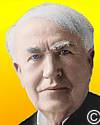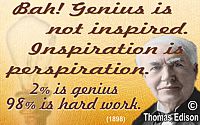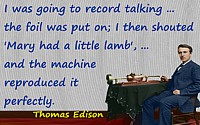 (source)
(source)
|
Thomas Edison
(11 Feb 1847 - 18 Oct 1931)
American inventor who was known internationally as “the Wizard of Menlo Park,” for the huge number of innovations coming from there, the world's first industrial research laboratory.
|
Thomas Edison Quotes on Experiment (6 quotes)
>> Click for 62 Science Quotes by Thomas Edison
>> Click for Thomas Edison Quotes on | Genius | Invention | Phonograph | Thinking |
>> Click for 62 Science Quotes by Thomas Edison
>> Click for Thomas Edison Quotes on | Genius | Invention | Phonograph | Thinking |
I am afraid of radium and polonium ... I don’t want to monkey with them.
— Thomas Edison
Quoted in 'Edison Fears Hidden Perils of the X-Rays', New York World (3 Aug 1903), 1.
I never allow myself to become discouraged under any circumstances. … After we had conducted
thousands of experiments on a certain project without solving the problem, … we had learned something. For we had learned for a certainty that the thing couldn’t be done that way, and that we would have to try some other way. We sometimes learn a lot from our failures if we have put into the effort the best thought and work we are capable of.
— Thomas Edison
As quoted from an interview by B.C. Forbes in The American Magazine (Jan 1921), 89.
It has been just so in all my inventions. The first step is an intuition—and comes with a burst, then difficulties arise. This thing that gives out and then that—“Bugs” as such little faults and difficulties are called show themselves and months of anxious watching, study and labor are requisite before commercial success—or failure—is certainly reached.
— Thomas Edison
Describing his invention of a storage battery that involved 10,296 experiments. Note Edison’s use of the term “Bug” in the engineering research field for a mechanical defect greatly predates the use of the term as applied by Admiral Grace Murray Hopper to a computing defect upon finding a moth in the electronic mainframe.] Letter to Theodore Puskas (18 Nov 1878). In The Yale Book of Quotations (2006), 226.
It is very different to make a practical system and to introduce it. A few experiments in the laboratory would prove the practicability of system long before it could be brought into general use. You can take a pipe and put a little coal in it, close it up, heat it and light the gas that comes out of the stem, but that is not introducing gas lighting. I'll bet that if it were discovered to-morrow in New York that gas could be made out of coal it would be at least five years before the system would be in general use.
— Thomas Edison
From the New York Herald (30 Jan 1879), as cited in Leslie Tomory, 'Building the First Gas Network, 1812-1820', Technology and Culture (Jan 2011), 52, No. 1, 75-102.
Problems in human engineering will receive during the coming years the same genius and attention which the nineteenth century gave to the more material forms of engineering.
We have laid good foundations for industrial prosperity, now we want to assure the happiness and growth of the workers through vocational education, vocational guidance, and wisely managed employment departments. A great field for industrial experimentation and statemanship is opening up.
We have laid good foundations for industrial prosperity, now we want to assure the happiness and growth of the workers through vocational education, vocational guidance, and wisely managed employment departments. A great field for industrial experimentation and statemanship is opening up.
— Thomas Edison
Letter printed in Engineering Magazine (Jan 1917), cover. Quoted in an article by Meyer Bloomfield, 'Relation of Foremen to the Working Force', reproduced in Daniel Bloomfield, Selected Articles on Employment Management (1919), 301.
X-rays ... I am afraid of them. I stopped experimenting with them two years ago, when I came near to losing my eyesight and Dally, my assistant practically lost the use of both of his arms.
— Thomas Edison
Quoted in 'Edison Fears Hidden Perils of the X-Rays', New York World (3 Aug 1903), 1.
See also:
- 11 Feb - short biography, births, deaths and events on date of Edison's birth.
- Thomas Edison Quote “Mary Had A Little Lamb” - Illustrated quote with Tinfoil Phonograph - Large 800 x 600px
- The Talking Phonograph - Thomas Edison's invention of his tinfoil phonograph - article in Scientific American (22 Dec 1877) - with illustrated quote, medium 500px.
- Thomas Edison Quote “Something there was no doubt of” - Illustrated quote + tinfoil phonograph engraving 800px
- Edison Fears Hidden Perils of the X-Rays - from New York World (3 Aug 1903).
- Thomas Edison - context of quote “Genius is not inspired. Inspiration is perspiration.” - Medium image (500 x 350 px)
- Thomas Edison - context of quote “Genius is not inspired. Inspiration is perspiration.” - Large image (800 x 600 px)
- First Thomas Edison Lamp Factory - from Edisonia (1904)
- Thomas Edison Quote “Something there was no doubt of” - Illustrated quote + tinfoil phonograph engraving 500px
- Thomas Edison Quote “Mary Had A Little Lamb” - Illustrated quote with Tinfoil Phonograph - Medium 500 x 350px
- 1 Oct - short biography, births, deaths and events on date of opening of Edison's Menlo Park lamp factory.
- Edison: A Biography, by Matthew Josephson. - book suggestion.
- Booklist for Thomas Edison.



 In science it often happens that scientists say, 'You know that's a really good argument; my position is mistaken,' and then they would actually change their minds and you never hear that old view from them again. They really do it. It doesn't happen as often as it should, because scientists are human and change is sometimes painful. But it happens every day. I cannot recall the last time something like that happened in politics or religion.
(1987) --
In science it often happens that scientists say, 'You know that's a really good argument; my position is mistaken,' and then they would actually change their minds and you never hear that old view from them again. They really do it. It doesn't happen as often as it should, because scientists are human and change is sometimes painful. But it happens every day. I cannot recall the last time something like that happened in politics or religion.
(1987) -- 


